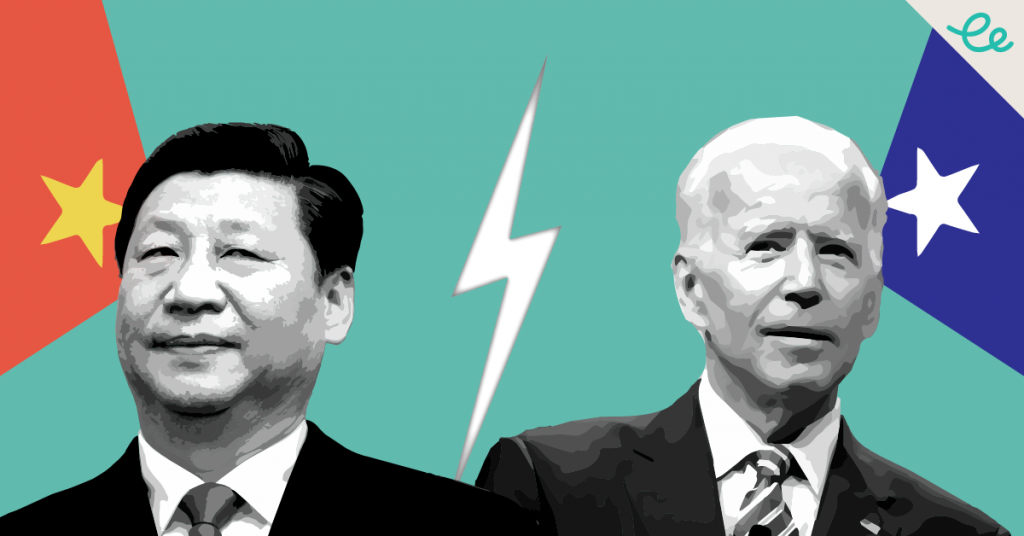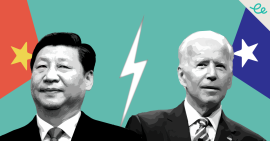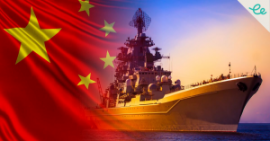Beijing and Washington Swap Competing Visions of Taiwan’s Future
An overpowering neighbour threatens invasion to “recover” territory and defend its citizens there. Sounds familiar? Nope, Beijing continues to insist, China and Taiwan are nothing like Russia and Ukraine. But the US sees a strong and alarming parallel, even as Washington vows its opposition to a new Cold War.
At the Shangri-La Dialogue in mid-June, a global talkfest on military matters, Chinese Senior Colonel Zhao Xiaozhuo took offence at “aggressive” US comparisons between rising cross-Strait tensions and the war in Ukraine.
Lloyd Austin and Wei Fenghe
US Defence Secretary Lloyd Austin had told the Singapore-based forum that the US would continue to stand by its allies, including Taiwan. “That’s especially important as the PRC adopts a more coercive and aggressive approach to its territorial claims,” said Austin.
His Chinese opposite number left no room for doubt about Beijing’s commitment to backing up those claims. Taiwan is part of China, and “China will definitely realise its reunification,” said Defence Minister General Wei Fenghe. “Let me make this clear: if anyone dares to split Taiwan from China, we will not hesitate to fight. We will fight at all costs. We will fight to the very end. This is the only choice for China,” he stressed.
That fighting spirit has translated into what Austin called an “alarming” increase in recent weeks in the number of unsafe, unprofessional encounters between Chinese planes and vessels with those of other countries, notably Canada and Australia. Ottawa and Canberra have accused the PLA of flying its fighter jets in dangerous passes to scare off foreign military aircraft in international airspace near China.
The obvious risk is another international crisis, as followed the death of a Chinese pilot who collided with an American spy plane over the South China Sea in 2001. Chinese military officials in recent months have repeatedly asserted that the Taiwan Strait isn’t international waters, during meetings with US counterparts, reported Peter Martin for Bloomberg. While China regularly protests US military moves in the Taiwan Strait, the waters’ legal status has not been a regular talking point before.
Observers may have expected fallout from Wei and Austin’s own collision course, given their nations’ contrasting standpoints. But the pair managed to hold a reasonably conciliatory meeting, their first in person, in Singapore on June 10. The bilateral meeting had been long delayed by Covid and protocol wranglings, as the US tried in vain to secure a more senior interlocutor, Xu Qiliang, Vice-Chair of the Central Military Commission.
Both sides stood firm on their opposing views over Taiwan’s right to rule itself. But Austin called the session an important step in efforts to develop lines of communication between the two militaries. Wei said the talks “went smoothly”.
Antony Blinken
Their meeting followed weeks of public acrimony from Beijing after US Secretary of State Antony Blinken finally set out US strategy to address China’s rise as a great power. His boss, President Joe Biden, repeated his protocol-breaking commitment to defend Taiwan. This isn’t a “new Cold War”, and the US will not block China from growing its economy, but Washington wants Beijing, the most serious challenge to global order, to adhere to international rules, said Blinken in a long-anticipated speech.
“We can’t rely on Beijing to change its trajectory,” said Blinken. “So we will shape the strategic environment around Beijing to advance our vision for an open and inclusive international system.” The US will form coalitions with other nations to limit the Chinese Communist Party’s influence, he added.
Foreign ministry spokesperson Hua Chunying retorted on Twitter that “the speech sounded more like a declaration of all-out strategic competition or war against China.” Foreign Minister Wang Yi added that “the US has in fact become a source of turbulence that undermines the current world order…We want to tell the US that China is not what the US has imagined.”
Joe Biden
For the third time in his presidency, Biden went off script on Taiwan, on May 23, stating his conviction that the US is willing get involved militarily to defend Taiwan against the mainland, instead of hewing to the “strategic ambiguity” that has long been US policy on East Asia’s most likely flashpoint. A day later, he backtracked to say he would maintain US policy toward Taiwan. But many of his congressional allies want Biden to be clearer about US support for Taiwan: “The bullies of the world need to know we’re going to take a stand,” said one.
China’s fighter pilots appear increasingly read to take a stand, in aerial manoeuvres – against foreign surveillance aircraft – that the US and allies consider worrying escalations. Beijing said these were reasonable responses to patrols threatening Chinese security. These provocations in the Asia Pacific, by “hotheads who could start a war”, are stirring tensions between China, the US and its allies, wrote David Rennie in The Economist. China’s deep distrust of America and the West is making it reckless, he warned.
Steady on, advised analyst Michael Swaine. He argues that the “threat inflation” now common in increasingly alarmist US evaluations of China’s military undermines those voices within China that favour moderation, and significantly raises the danger of Sino–American crises and military conflict.
What to expect?
Don’t expect the US to back down. “What has happened here in Washington in the last four and a half years is the coming together of bipartisan majorities in the Congress to cooperate closely with a hard-line policy toward China from Trump administration officials – I wouldn’t say Mr. Trump necessarily – and carried over with the Biden administration,” said China scholar Robert Sutter. He believes a hard policy toward China will continue regardless of who’s in the White House.
Do expect more rockiness across the Strait, and between Beijing and Washington. Even as the Wei-Austin meeting signalled an attempt to lower tensions. Analysts everywhere are weighing up the extent to which Putin’s war on Ukraine accelerates Xi Jinping’s Taiwan timetable, and whether Xi will act on the calculation that invading now, before the US helps Taiwan further solidify its defences, may delivers a less costly engagement for Beijing.
In the meantime, the risks of conflict increase with every near miss above Pacific waters. As security expert John Blaxland told the New York Times, “there are split-second differences between this being a passing headline and this being a major incident with enduring international ramifications.”
Just as we predicted in the summer of 2020when we set up our special Enodo Taiwan Watch service to monitor and assess the risk of a Sino-US conflict over Taiwan. If long-standing tension between Washington and Beijing over Taiwan were to spill over into outright conflict, the implications for the global economy and markets would be momentous. This is the main risk investors, business leaders and policymakers must watch out for now and understand better as analysis in the heat of the moment would be near-impossible.
Related articles:
China to Taiwan: “You Can’t Fight Us”
US China Relations: Diplomats Meet – And Talk Past Each Other
US China Relations: Biden Assembles United Front Against Beijing
US China Relations: Competition Replaces the Era of Engagement
US China Relations: Bills, Boats and a “Battle for the Century”
Democracy vs Autocracy: Biden Sets Out Challenge of US China Relations
Beijing Wants Reset of US China Relations; DC Dislikes the Terms







